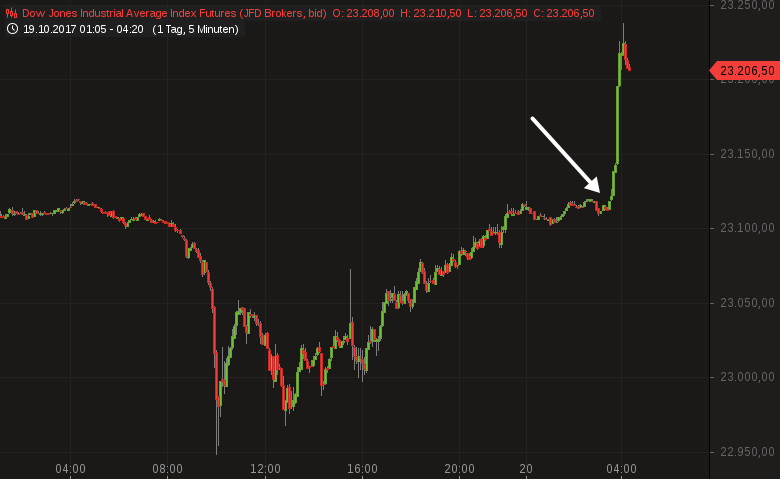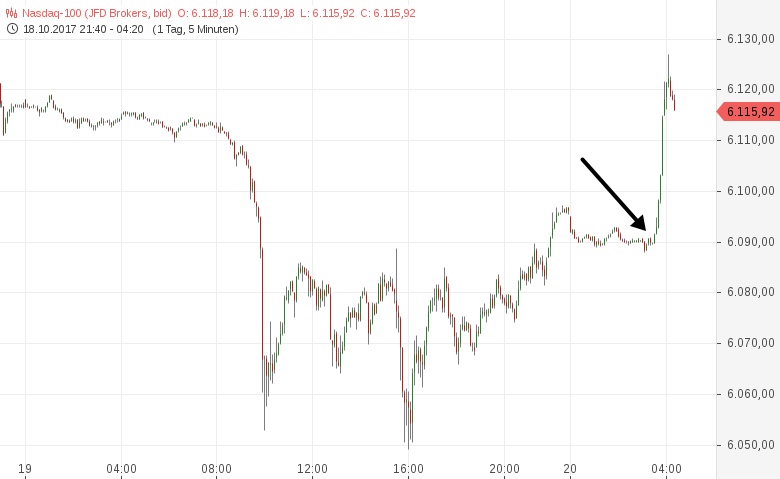Dow Jones und Nasdaq Future brechen im asiatischen Handel nach oben aus
- Lesezeichen für Artikel anlegen
- Artikel Url in die Zwischenablage kopieren
- Artikel per Mail weiterleiten
- Artikel auf X teilen
- Artikel auf WhatsApp teilen
- Ausdrucken oder als PDF speichern
Erwähnte Instrumente
- Dow Jones Industrial Average Index FuturesAktueller Kursstand: (TTMzero Indikation)
Solch starke US Indexfuturesbewegungen im nächtlichen Handel sind ungewöhnlich.


Kraken ist die regulierte und sichere Krypto-Börse für Trader in Deutschland. Seit 2011 steht für uns Vertrauen und Transparenz im Mittelpunkt. Mit über 550 handelbaren Kryptowährungen bieten wir eine große Auswahl für Einsteiger und Profis.
Die Kraken App ermöglicht einen schnellen Start, während Kraken Pro professionelle Tools und niedrige Gebühren bietet. Ein Konto kannst du in wenigen Minuten auf kraken.com eröffnen.
Passende Produkte
| WKN | Long/Short | KO | Hebel | Laufzeit | Bid | Ask |
|---|


Guten Morgen. Never sleeping Harry? Auch gut für den DAX, schlecht für Gold, die SKS löst sich nicht nach Norden auf. Gold overnight von 1292 auf 1286, no fear, no Gold..
Schön, mein EURUSD short trifft TP, im Schlaf. fein
Für mich sind das alles Stop-fishing-Manöver der BigBoys. Gerade im asiatisches Handel kann man mit relativ geringen Aufwand "viel" bewegen. Zum Kummer der 90% Retailer.....
Danke Harry, morgens aufstehen und schon die news auf dem Tisch haben ist ein toller Service.
kras
Quelle: CNBC https://www.cnbc.com/2017/10/17/bitcoin-is-specula...
Senate Republicans approved a $4 trillion budget measure Thursday, taking a crucial step toward their goal of passing a tax plan this year.
The chamber approved the budget resolution by a 51-49 vote. Sen. Rand Paul, R-Ky., was the only GOP senator to vote against it.
Senators will now have to reconcile their budget resolution with a separate one passed by the House. The other chamber could simply choose to pass the Senate budget blueprint.
Passing a budget unlocks reconciliation, which enables the GOP to pass a tax bill with a simple 51-vote majority in the Senate. Using the tool removes the need for winning Democratic support, which would likely sink a GOP tax measure.
Republicans have described overhauling the American tax system as crucial to achieving campaign promises and avoiding an electoral setback next year. Disagreements within the party already derailed one key campaign plank, repealing the Affordable Care Act.
President Donald Trump, Senate Majority Leader Mitch McConnell, R-Ky., and House Speaker Paul Ryan, R-Wis., contend tax cuts will unlock economic growth.
Lawmakers have differences to hash out before they can approve a joint budget and move toward passing a tax bill. If lawmakers choose to go to a conference committee, it could take Congress until late October or early November to clear a budget.
Among the variations, the Senate version would allow for tax cuts to add $1.5 trillion to the deficit over a decade. In contrast, the House called for a revenue-neutral proposal.
Republicans hope to pass a bill that broadly chops individual and corporate tax rates. A framework GOP officials released late last monthsaid the proposal would double the standard deduction and scrap provisions like the estate tax and alternative minimum tax.
But other than a proposal to get rid of state and local tax deductions, it largely lacks tools to fund those tax cuts. That could put a hole in the budget deficit, even after economic growth is taken into account.
Republicans have not yet introduced a concrete tax bill. The process of crafting the full plan will start once the House and Senate can pass a budget resolution.
Even amid challenges, Trump and McConnell this week said they still want to pass a tax plan this year.
Democrats, even those up for re-election next year in states Trump won in 2016, appear unlikely to support the tax bill.
The Senate passed its fiscal year 2018 budget resolution Thursday, opening the door for the passage of Republican leadership’s massive package to overhaul the tax code.
The resolution passed by a vote of 51-49, with Sen. Rand Paul representing the only Republican defector.